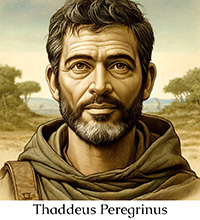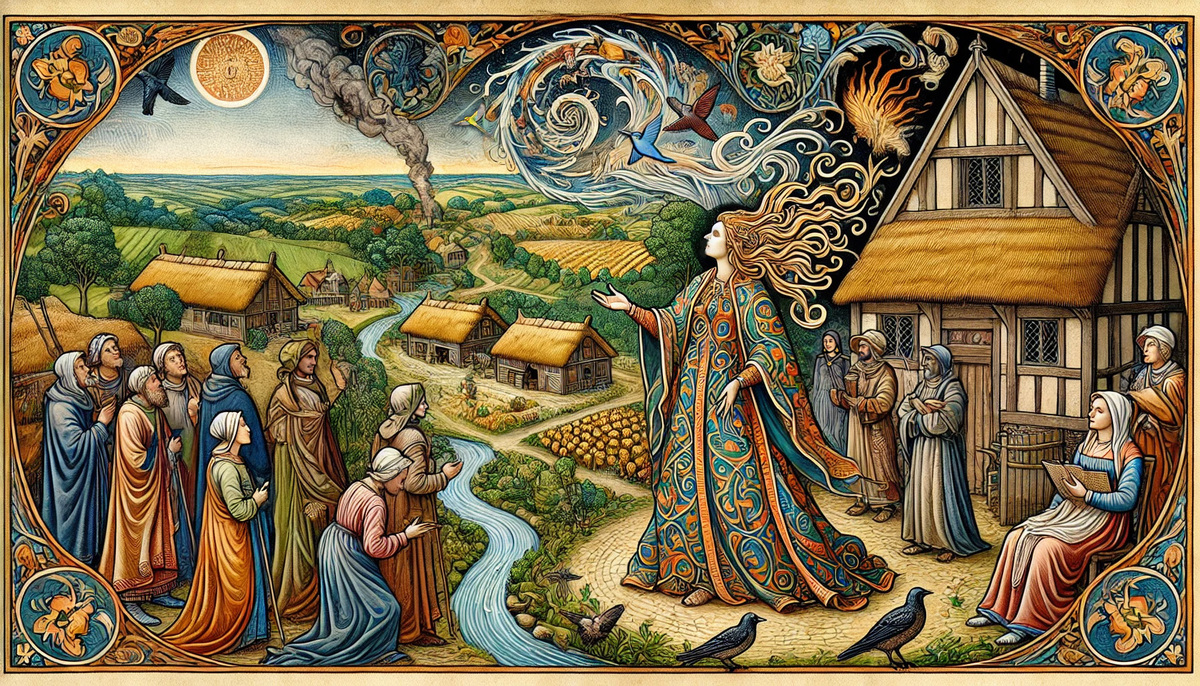Once upon a time, in the quaint village of Hearthwick, there lived a prophetess named Elira. Known for her piercing eyes and serene demeanor, she had earned the villagers’ respect over the years for her wisdom, even though her predictions were often enigmatic. One crisp autumn morning, she stood in the town square, gazing skyward as if reading invisible signs.
“Three great events are coming,” she declared, her voice firm but gentle. “The first: fire shall consume the village. The second: a great shadow will descend upon us. And the third: the river will rise and engulf what we have built.”
The villagers froze, their daily chatter replaced by murmurs of dread. These words were dire, apocalyptic even. Fear crept into their hearts, and soon the town was abuzz with worried speculation. The baker fretted about losing his ovens, the blacksmith feared for his forge, and the farmers whispered anxiously about their crops. Even the children played less exuberantly, as though a shadow already loomed over the village.
A week later, the first prophecy seemed to come true. A blaze broke out in the granary, sending villagers scrambling to douse the flames. Though the fire was quickly contained, it revealed something remarkable. As the villagers inspected the damage, they discovered that termites had been gnawing away at the structure’s beams. Left unchecked, the infestation could have caused the granary to collapse, ruining the grain they needed to get through the winter.
The sight of the fire’s aftermath brought both fear and a sense of urgency. Villagers who rarely spoke found themselves working side by side, sharing tools, expertise, and laughter despite the initial panic. This cooperation strengthened bonds within the community. The blacksmith offered to forge stronger hinges for the granary doors, and the carpenter donated fresh timber for the repairs. The children carried smaller pieces of wood, eager to help.
“The fire was a blessing in disguise,” said the baker, wiping soot from his hands. “Had we not acted, the termites might have ruined us.”
By the time the repairs were complete, the granary stood stronger than ever. Elira’s words were on everyone’s minds, but now they carried less fear and more curiosity.
Not long after, a strange darkness spread across the village in the middle of the day. The sky turned an eerie gray, and the villagers gathered in the square, clutching their children and whispering of doom.
But the shadow was no curse; it was an enormous flock of migrating starlings, settling in the fields. The birds moved as one, swirling in mesmerizing patterns that seemed almost otherworldly. While the villagers watched in awe, the birds feasted on pests, clearing the fields of threats to the crops.
“Look at them work,” said Farmer Lorrin, his voice filled with wonder. “They’ve done more in an hour than we could in weeks.”
The children, who had been frightened at first, soon began to laugh and point at the swirling shapes, imagining them as stories in motion. The adults, initially wary, relaxed as they realized the birds brought no harm. By the time the starlings took to the skies again, the fields were pristine. The next harvest was unusually bountiful, free from the usual blight of insects. The townsfolk began to see Elira’s prediction in a new light.
“She must have known,” whispered one villager to another. “The shadow brought blessings, not ruin.”
Months passed, and winter gave way to a wet and stormy spring. Heavy rains swelled the riverbanks, and one evening, the river surged beyond its boundaries, flooding the lower fields. At first, the villagers panicked, fearing for their lives. Furniture was hastily moved to higher ground, and livestock were herded to safety. By morning, the damage seemed extensive, and the villagers despaired.
But the rising waters never reached the village itself — just the fields around the village. When the waters receded, they left behind a rich layer of silt, dark and fertile. The floodwaters had also filled the old, dried-up irrigation channels that had been beyond their ability to repair. Inspired by this unexpected boon, the villagers set to work cleaning and widening the channels, ensuring they could handle future floods.
“The river’s rise wasn’t our undoing,” said Lorrin. “It was a gift from nature, accomplishing what we had been unable to do for ourselves.”
The farmers marveled at how easy it was now to water their fields. Crops thrived, and the irrigation system worked better than it had in years. That summer, the fields were lush with crops, and the town celebrated with a feast, honoring the harvest and their newfound resilience.
By now, the villagers’ fear had turned to gratitude. They approached Elira in the square, bowing their heads. “We did not understand your words, Prophetess,” the village elder said. “You have brought us blessings disguised as trials.”
Elira smiled, her eyes twinkling. “The future speaks in riddles, and our hearts often leap to fear when we do not yet see the whole story. But remember, not all change is ruin, and not all shadows bring darkness.”
Encouraged by her words, the villagers began to reflect on their reactions to the prophecies. They realized how quickly they had assumed the worst, blinded by their own fears. They resolved to face future challenges with open hearts and minds, trusting that even trials might hold hidden gifts.
Elira continued to walk among them. Her presence became a comforting reminder that life’s uncertainties often carried the seeds of unexpected blessings. The village flourished, its people more united and hopeful than ever before.
And in quiet moments, when the river’s waters glistened under the sun or the starlings danced across the sky, the villagers would pause and remember the lessons of the three great events. They learned that sometimes adversity is not a calamity, but an opportunity in disguise.
— Thaddeus Peregrinus

Thaddeus Peregrinus, a wandering scholar whose journey through distant lands has spanned both time and legend, has spent a lifetime seeking wisdom in the forgotten corners of the world. Although learned in philosophy, ancient texts, and the mysteries of the natural world, Thaddeus has found that true understanding comes not from answers, but from leaning into the unfathomable Mystery of Life. Thaddeus is currently a “Wanderer in Residence” at GrailHeart.
![]()
Thank you for reading GrailHeart!
Feel free to send me your thoughts and suggestions — I respond to all sincere emails. (Spam, etc. will be summarily deleted.) Click here for my contact form.
This story was written under the pseudonym Thaddeus Peregrinus, part of the GrailHeart creative quest. If you’d like to connect with me directly, please reach out through the contact form above.
The fine wares in the GrailHeart Shoppe inspire your day and help keep us thriving! Click here.
May you find serenity in your journey, courage in your challenges, and wisdom in your heart.


